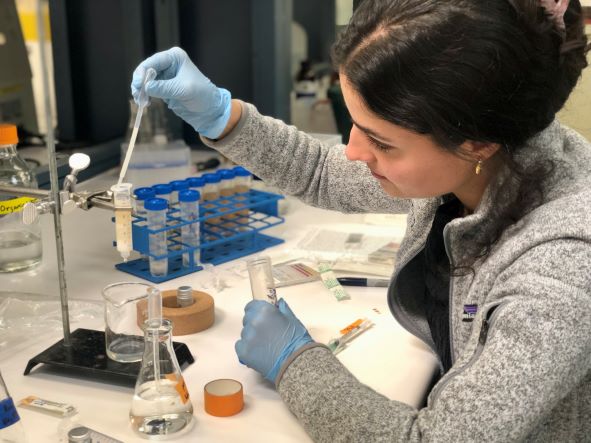
Founded in 2020 by Neeka and Leila Mashouf, Rubi Laboratories is pioneering the creation of carbon-negative cellulosic textiles through its patent-pending, cell-free biocatalytic process, starting with viscose.
To do this, Rubi captures CO2 from the waste streams of manufacturing facilities using its proprietary enzyme system which can capture and convert CO2 from a gas input at any concentration. The CO2 is then converted into cellulose, which can then be used to create viscose-based yarn. By utilising enzymes as the catalyst, Rubi is able to turn 100% of CO2 inputted to the end product with zero-waste.

Discover B2B Marketing That Performs
Combine business intelligence and editorial excellence to reach engaged professionals across 36 leading media platforms.
The San Francisco-based company says it is providing a carbon negative, zero-water and zero-land alternative to the viscose industry, which typically relies on pulp derived from wood.
Its new funding will enable research and development (R&D) and commercialisation for the apparel industry with its first textile samples expected to be available next month.
Rubi adds it has validated its technology by creating a successful prototype and has currently agreed test plans with “numerous” tier-one global retail and fashion brands.
“We’re at a pivotal moment in time where mature modern technologies and advances in biotech can meet to build a world where human prosperity and economic growth are planet-positive,” says Rubi CEO and co-founder Neeka Mashouf.

US Tariffs are shifting - will you react or anticipate?
Don’t let policy changes catch you off guard. Stay proactive with real-time data and expert analysis.
By GlobalData“With increased consumer and government pressure to solve fashion’s reliance on carbon-heavy textiles, innovation in textiles can have a dramatic impact on reducing fashion’s carbon emissions. In turn, we’re seeing brands demonstrating a willingness to pay a premium for these materials, as long as there’s a tangible line of sight to reach price parity with traditional materials eventually, both because they know it will drive costs down in the longer term, but also because it supports them in terms of achieving their sustainability goals.”
Rubi adds the funding comes at a critical moment in time for the fashion industry as major brands set ambitious targets to zero carbon, or carbon reduction goals, by 2030.
Even though today’s viscose and cotton textiles come from plants, their processing and manufacturing contribute over 10kg of CO2 per kg of textile, Rubi notes, adding the company’s technology enables its textiles to be net carbon-negative per kg of textile.
The main problem for fashion brands, it says, is sourcing carbon-free materials that can be scaled to meet production, and at price parity.
Rubi’s funding round was led by Talis Capital and Necessary Ventures, with participation from Climactic, Collaborative Fund, Plug and Play, Incite Ventures, Darco Capital, Cayuse Partners, Axial VC, Climate Capital Collective, and CapitalX.
A number of industry leaders joined as angels, including James Reinhart, CEO and founder of ThredUp; Manny Mashouf, CEO and founder of Bebe Stores; Nicolaj Reffstrup, founder of Ganni; Alexander Lorestanti, CEO and co-founder of Geltor; and Rei Wang, co-founder of The Grand and former CEO of Dorm Room Fund. The round also includes a $250,000 grant from the National Science Foundation.
A number of industry players are explorin carbon-negative textiles and materials. US sportswear giant Nike, Inc said last summer it will explore the use of a carbon-negative biomaterial in a variety of applications as part of its work to reduce its carbon footprint.
In addition, Canadian footwear manufacturer Sole unveiled what it claimed was the world’s first carbon-negative insoles last September.
.





